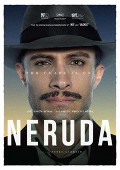
Directed by
Pablo Larraín
107 minutes
Rated M
Reviewed by
Bernard Hemingway

Neruda
Synopsis: In the late 1940s a police inspector, Oscar Peluchonneau (Gael García Bernal), pursues Chilean poet, diplomat and vocal Communist Party member, Pablo Neruda (Luis Gnecco), who has gone into hiding from the ruling right-wing regime.
Anyone looking for a straightforward historical biopic of Pablo Neruda would do well to look elsewhere, for this film which conceptually is worthy of the blind Argentinian writer Jorge Luis Borges or the Colombian novelist Gabriel García Márquez is a mythopoeticised portrait of the famous artist-politician that focusses on an imagined relationship between the poet and his dogged pursuer. The Latin connection is vital.
Neruda is a kind of historical fantasy that as it progresses has less to do with the facts of the matter and more to do with a kind of metaphysical symbiosis between the two men. To Peluchonneau, at least in his own mind (of which, as he narrates the pursuit, we hear a lot) Neruda’s flight gives him the opportunity to prove his professional value to his bosses (and ultimately his famous father). For Neruda the relentless pursuit elevates him to the status of an outlaw hero. Neruda’s wife Delia (Mercedes Morán), goes so far as to tell Peluchonneau that her husband created him, an idea that the vain little man finds offensive yet at the same time,rather flattering. If this was a more conventional biopic as was Pablo Larraín’s previous film, Jackie (2016) this conceit would be merely a catalyst for the plot but here identities are more fluid, actions more perverse driven by obscure forces of which the protagonists are mere playthings..
Such considerations give the film its character and in that respect one can’t help but think that it will speak most eloquently to Chilean audiences and especially those familiar with Neruda’s work (not an inconsiderable number as poets have a very different standing in Latin America than they do in West and further, Neruda was a prominent and popular voice for worker’s rights).
This presumption of familiarity one accepts but I struggled with some of Larraín's formal choices. Particularly in the first part of the film the camera swirls around its characters, shooting directly towards the light and the resulting imagery looks like colour photographs that have been left out in the sun too long. The editing favours frequent, often overlapping cuts, creating an almost “MTV” effect that is unnecessarily intrusive and has no evident justification in, indeed works against, the subject matter. The result is that one feels that Larrain is striving for effect. This also applies to the evident film noir-style back projections which are used to frame Peluchonneau in cars and on motorbike as he chases the fleeing poet who consistently escapes in the nick of time leaving behind the hapless detective. As the film goes on with his caterpillar moustache the buttoned down little policeman reminds one of Inspector Clouseau, made even less credible by his lack of height. The net effect feels trivializing.
Presumably the formal irregularities are supposed to somehow aesthetically mirror the man and his work but if so, they don't have that effect. Although I don’t know Neruda’s poetry, what of it is used here feels like a few standard quotations with no real attempt to shed any light on its importance, something which you’d think any biopic, no matter how oblique, would do.
There is no doubt that Neruda is imaginative in execution and that it often looks seductively good. Its portrayal of 1940s Chilean high society and its old world streetscapes are impressive as is its use of Chile's stark mountain landscape but unless you have at least a good working knowledge of the man and his work, I’m not sure how much you’ll get out of this film.

Want more about this film?


Want something different?




